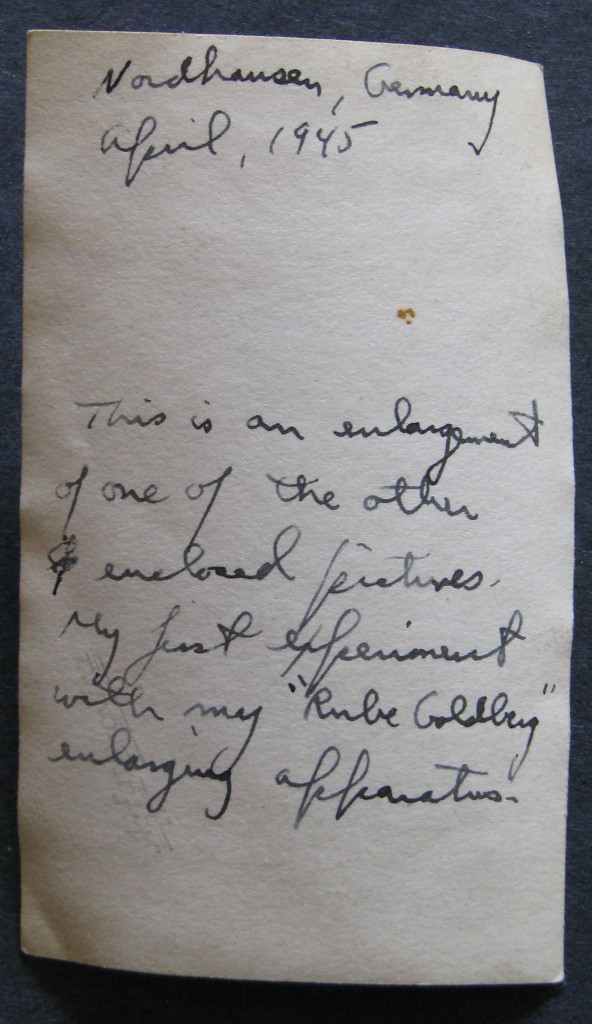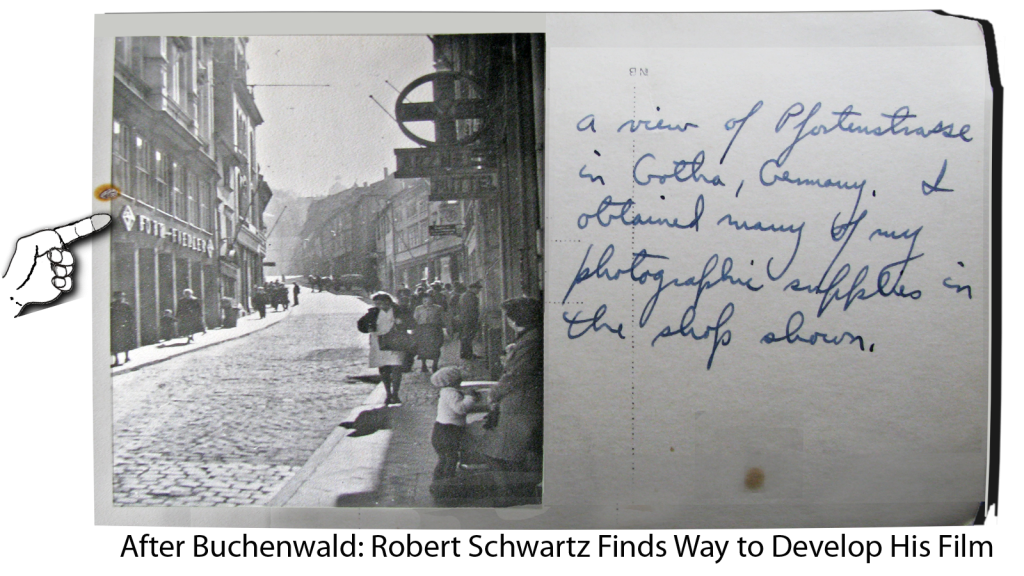Gotha Germany, Until recently I had no idea how my father had found the chemicals he used to develop the film. Then, reading about this town near Buchenwald, I found the answer.
Gotha was liberated before Buchenwald. On April 4, 1945, elements of the United States Army’s 89th Infantry Division and the 4th Armored Division liberated a concentration camp, Ohrdruf, outside the town of Gotha . Although the Americans didn’t know it at the time, or even know about Buchenwald, Ohrdorf, held 1,000 prisoners in transit to death in Buchenwald. General Eisenhower mentioned Gotha in his book “Crusade in Europe,” as the nearest city to the “horror camp” at Ohrdruf-Nord.
As soon as he saw the horrors of Ohrdurf, Eisenhower ordered every American soldier in the area who was not on the front lines to visit Ohrdruf and Buchenwald. He also ordered every citizen of the town of Gotha to personally tour the camp. After having done so, the mayor and his wife went home and hanged themselves. Later on Ike wrote to Mamie, “I never dreamed that such cruelty, bestiality, and savagery could really exist in this world.”
General Eisenhower ordered that all the civilian news media and military combat camera units be required to visit the camps and record their observations in print, pictures and film. As he explained to General Marshall, “I made the visit deliberately, in order to be in a position to give first-hand evidence of these things if ever, in the future, there develops a tendency to charge these allegations merely to ‘propaganda.’ ”
 My Dad, as we now know, also documented the camp. I have the Argus C3 he used to take the pictures, He told me he had found chemicals in a pharmacy after leaving Buchenwald, but now it appears from this photo that he must have gone to Gotha after being ordered to leave the camp. The chemicals actually came from a “Foto” shop in Gotha. He also jury rigged an enlarger and used it to enlarge some of the negatives he had shot in Nordhausen, He called this his “Rube Goldberg enlarging apparatus.”
My Dad, as we now know, also documented the camp. I have the Argus C3 he used to take the pictures, He told me he had found chemicals in a pharmacy after leaving Buchenwald, but now it appears from this photo that he must have gone to Gotha after being ordered to leave the camp. The chemicals actually came from a “Foto” shop in Gotha. He also jury rigged an enlarger and used it to enlarge some of the negatives he had shot in Nordhausen, He called this his “Rube Goldberg enlarging apparatus.”
I do not know what else happened to my Dad in Gotha, however, I have a suspicion. Many times when I asked about his experiences in WWII, my Mom would tell me that my Dad had nightmares. Oddly, he told me that these were not only about the horrors of Buchenwald but about his own actions afterwards. He told me he governed a town and was so depressed that he was drunk a lot of the time. He was clearly ashamed of what he saw then and maybe of what he himself allowed to happen. Robert would not talk about the Germans under his control, however, as I read about Gotha, I may have gotten an idea. I learned about the atrocities the Americans brought upon the German POWs held in Gotha’s prison camp. One account:
In his book entitled “Other Losses,” James Bacque wrote the following:
There were no tents in the Gotha DEF (POW) camp, only the usual barbed wire fences round a field soon churned to mud. On the first day, they received a small ration of food, which was then cut in half. In order to get it, they were forced to run a gauntlet. Hunched over, they ran between lines of guards who hit them with sticks as they scurried towards their food. On April 27, they were transferred to the U.S. camp at Heidesheim further west where there was no food at all for days, then very little.
The following quote by Lieutenant Ernest Fisher, of the 101st Airborne Division and former Senior Historian of the United States Army is from the same book :
Starting in April 1945, the United States Army and the French Army casually annihilated about one million men, most of them in American camps.
Eisenhower’s hatred, passed through the lens of a compliant military bureaucracy, produced the horror of death camps unequaled by anything in American military history… Stephen Ambrose, a noted World War II historian, disputes the claims made by James Bacque. http://www.nizkor.org/hweb/people/b/bacque-james/ambrose-001.html
Whatever Ambrose might say, it is impossible to imagine the feelings Ike had in April 1945 and even harder to imagine my father’s feelings. Whatever the truth about the months after April, 1945, the result was that I only got to review my Dad’s pictures three years after his death. Now, I am trying as hard as I can to rescue that heritage.
